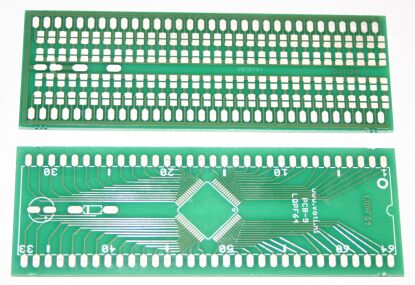Futurelec is a funny one; I generally avoid them. Theres a lot of bad blood around the net.. some people had really poor service (got nothing, at all, ripped off), where a lot of people have just had slow; myself, I ordered once and it took something like 9 weeks to arrive, but it did. When it did arrive (abot 40 ICs of various kinds).. thery were mostly right, but some were wrong.. they swapped package types, so I got some surface mount of various kinds, inmstead of DIP, but same part number. Cheap as hell, but you get what you pay for in service

Mind you, I also ordered a pile of sockets from them .. around me, a tin socket is about 10c/pin (a 40pin socket is $4).. just brutal. From futurelec a year ago, I got them for 15c each or something, some as low as 5c. They're cheap for sure, and melt if you look at them funny, but they work. You just can't argue with those prices sometimes.
So Futurelec is on the list of possible stores, but for me, its way down at the bottom

--> those square SMT adaptors aren't really useful imho; they do get you a DIP board, but then its still not breadboardable, so you have to in turn make a perfboard to map it out for BBing sake. Bit of a drag.. but I get it, with 100+ pins, its hard to justify a shark-fin thats 50 pins or more wide

(I've done it.)
.. The reason I bring up adaptors is specifically for this:
- Assuming I make a few kits..
.... most people are terrified of surface mount soldering for any high numebr of pins (say 48+, certainly 64+).
... I have some equipment that makes it a bit easier for me (solder paste, rework station, and a magnifier microscope (Andonstar ftw!))
... it shifts the error to me, not downstream kit buyer.
--> so I could sell a already solder-to-adaptor set of cpu options for those who are afraid to risk soldering the SMT ICs themselves
If its just me, I'd just put the SMT parts on the board and call it a day.
Its that question.
- build for me?
- build for you guys?
- build for public? (newbies?)
- and design for production (based on limits of selected boardhouse, etc)
Really, I should just build it for me, rev1, and see if anyone wants it from there, but I rather like to keep the options for everyone else in mind

jeff
edit: You're right though, adaptors for QFP64 variants, for shipping out are cheap. (QQFP and LQFP tend to differ.. even two different QDFP adaptors you have to be careful; theres multiple pitches and pin widths called TQFP or LQFP; I've got some adaptors that handle both .. one pitch one side, flip it over for the other pitch, that sort of thing. Crazy, but you have to be careful.)
... let me check the specs on the ez80 lqfp100 .. if that tqfp adaptor fits, it coudl be an option if I can solder it reasonably successfully myself. Thanks for that idea..
edit the secundus:
okay, its hard to see in the ez80 lqgp100 specs; it is clear the pin spacing ("BSD" pitch) is 0.5mm (same as TQFP100 usually); the pin widths isn't on the datasheet.. theres a couple arrows there, but no definition, doh

Still, perhaps the 0.5mm pitch is all you need.
I've got a few of those TQFP adaptors already, so maybe I'll try it out.. if its easy enough with my rework station, it could be a valid option.. give me $10/processor or something, and you can plug in whichever module you want or something.
On the one hand, theres a place near me that actually sells QFP64->DIP64 adaptors, which is what I use for prototyping.. but they're $10-$15 a piece (currently $15, ouch!), though a bit cheaper if you place some tricks. Still, I'd have to make my own.. really, shoudl be able to get them for $5 a piece if I make them myself, or less. Anyway. Very few reputable places make QFP100 and up adaptors.. I've got some from Thailand, but they're these big huuge affairs, and not the best.


